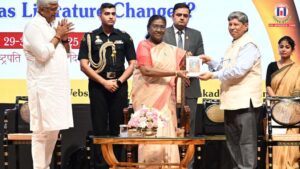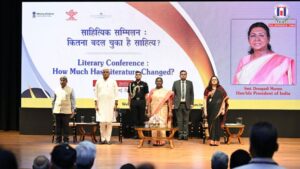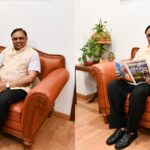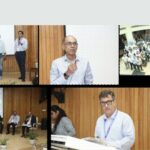
New Delhi, May 30, 2025 : In a landmark celebration of India’s literary heritage, a national literary conference titled “How Much Has Literature Changed?” was held at the Rashtrapati Bhavan Cultural Centre on May 30. The event, organized by the Sahitya Akademi in collaboration with Rashtrapati Bhavan, brought together eminent writers, poets, and literary thinkers from across the country. The conference was inaugurated by President Droupadi Murmu, who emphasized the timeless relevance of literature in shaping individual ideals and societal values.

In her inaugural address, President Murmu expressed her deep admiration for writers and said it had long been her wish to host such a gathering at Rashtrapati Bhavan. She invoked the words of Utkalmani Gopabandhu Das and reflected on how literature continues to serve as a unifying and guiding force in society. Recalling her personal connection with Indian literature, she mentioned the profound influence of Fakir Mohan Senapati’s short story “Rewati” on her own life. She also cited Draupadi by Pratibha Ray as a powerful example of literature rooted in human sensibilities.
“Ordinary people can draw inspiration from literature and strive to realize their ideals,” said the President, noting that while literature evolves with time, fundamental elements like compassion and human connection remain unchanged.
Union Minister of Culture and Tourism Gajendra Singh Shekhawat, speaking as the Guest of Honour, remarked that rather than questioning how much literature has changed, it is more important to ask how much society has evolved, as literature mirrors societal values and transformations. He cited Munshi Premchand’s work as a testament to literature’s power to confront social evils. Shekhawat also highlighted the ongoing cultural renaissance under the leadership of Prime Minister Narendra Modi and lauded the significance of hosting the conference at Rashtrapati Bhavan as a symbol of national cultural revival.

Special Secretary and Financial Advisor to the Ministry of Culture, Ranjana Chopra, acknowledged the pivotal role played by Sahitya Akademi in promoting literary excellence. She highlighted key initiatives such as the timely publication of a book on Netaji Subhas Chandra Bose and global literary forums like Unmesha. She also noted the emerging challenges faced by literature in the digital era, particularly in preserving originality amidst technological and social shifts.
The conference also featured a Poets’ Meet titled “Straight from the Heart,” where poets from diverse linguistic backgrounds shared heartfelt verses. Participants included Ranajit Das (Bengali), Mamang Dai (English), Dileep Jhaveri (Gujarati), Arun Kamal (Hindi), Mahesh Garg (Hindi), Shafi Shauq (Kashmiri), Damayanti Beshra (Santali), and Ravi Subramaniyan (Tamil). Their poetry, rich with raw emotion and cultural insight, resonated deeply with the audience.
The session was chaired by renowned Urdu poet Sheen Kaaf Nizam, who captivated the audience with his poetry and emphasized that poetry is an experience to be felt, not just heard.
The event served as a vibrant celebration of India’s literary diversity, offering both a reflection on the past and a vision for the future of Indian literature in a rapidly changing world.














No Comments: